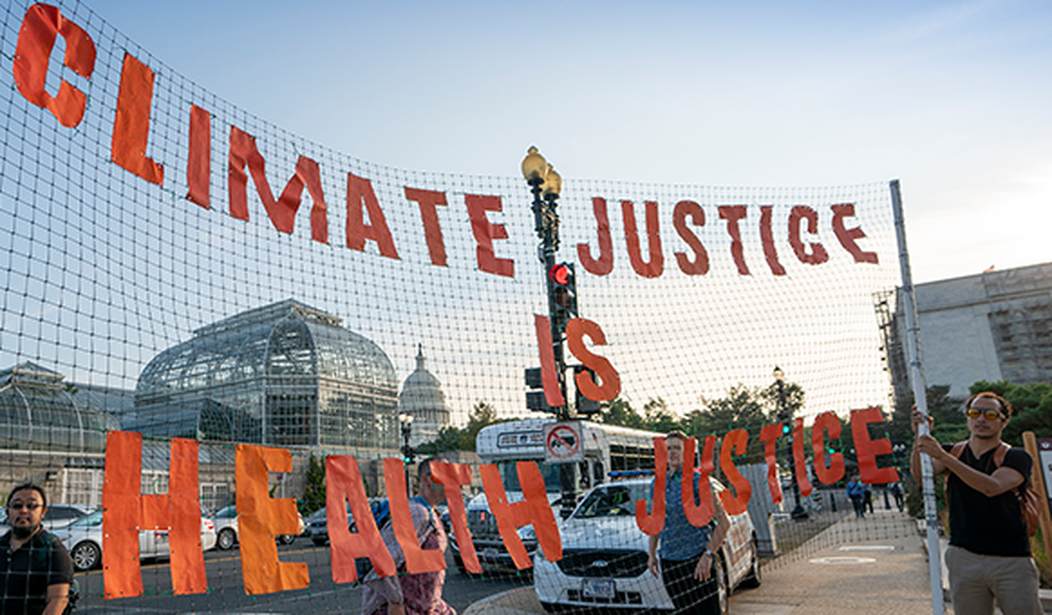President Joe Biden and Democrats have made it no secret that a major priority of theirs is combating a so-called "climate emergency," especially when it comes to the recent passage of the misnamed "Inflation Reduction Act." Another poll has revealed that most Americans don't have the issue as top of mind. In fact, their views of climate change are shifting away from the alarmist view that the Biden administration holds.
The AP-NORC poll in question was released on Monday and conducted from June 23-27, surveying 1,053 adults with a margin of error of plus or minus four percentage points.
A write-up from the Associated Press highlights a contrast between Americans' attitudes now and in August 2019. While a plurality of respondents in both surveys say they are "extremely/very concerned" about climate change, it was by a much higher amount in 2019.
In that survey, 44 percent said as much, while 29 percent said they were "moderately concerned," and 25 percent said they were "not very/not at all concerned."
This time around, however, just 35 percent said they were "extremely/very concerned." The other options made significant gains. Thirty-three percent said they were "moderately concerned," while 32 percent said they were "not very/not at all concerned."
Recommended
As the write-up acknowledged:
Many climate scientists told The Associated Press that the shifts are concerning but not surprising given that individuals are feeling overwhelmed by a range of issues, now including an economy plagued by inflation after more than two years of a pandemic. In addition to being outpaced by other issues, climate change or the environment are mentioned as priorities by fewer Americans now than just a few years ago, according to the poll.
This sentiment comes from Americans as they are more pessimistic about the effect they can have on the environment and the impact of climate change. This takeaway was included in headlines for the AP and AP-NORC. A majority of respondents, 70 percent, believe climate change is happening, while 66 percent believe it is caused entirely or mostly by human activity.
The results also reveal something of an exhausting way to live and even something of a dilemma for Americans, considering that 70 percent think it is necessary for individuals to make major lifestyle changes in order to actually be able to combat climate change.
Amongst Americans who believe climate change is happening, 70% think that it is necessary for individuals to make major lifestyle changes to combat climate change. https://t.co/skeTRUJ0ML pic.twitter.com/WvKn1z9lzn
— AP-NORC Center (@APNORC) August 15, 2022
The poll also highlighted how while Americans may be engaging in "eco-friendly actions," they are making such changes more so due to cost rather than how it affects the environment.
While many Americans have taken eco-friendly actions, it is not always for environmental reasons. Many do so to save money or because it convenient. https://t.co/skeTRUrpob pic.twitter.com/XlgzHcnwQp
— AP-NORC Center (@APNORC) August 15, 2022
Of the ten actions listed, only three involve a plurality or a majority of Americans saying they do so because it will "help the climate or reduce climate change." For instance, 43 percent said they "used an electricity supplier that gets power from renewable sources" for such reasons, while 68 percent said as much for why they "reduced the amount of paper or plastic that you use." Fifty-six percent said that's why they "composted food waste."
It's also worth noting, though, that a majority of Americans don't even use such energy supplies or compost food waste, with 53 percent and 64 percent, respectively, saying they do not.
At its conclusion, the write-up advertises its climate initiative, which it announced in February of this year, hailing it as a "sweeping climate journalism initiative."
As I highlighted in a VIP article from last month, very few Americans consider climate change to be a top issue. In fact, according to a poll at the time from The New York Times/Siena College, just 1 percent of voters considered it the most important issue, with just 3 percent of Democrats saying so.
Further, the AP acknowledges that voters find many more issues far more important ahead of the midterms, especially when it comes to economic issues like inflation, which is bolstered by many other polls. This includes FiveThirtyEight, which has released several surveys leading up to the upcoming midterms on what issues matter to Americans. Climate change has yet to be a top issue and isn't likely to become one.

























